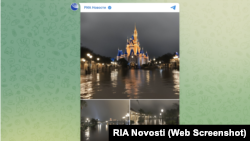On October 10, Russia’s state-owned news agency RIA Novosti published in its Telegram channel three images of a flooded Walt Disney World theme park in Orlando, Florida, claiming they showed the effects of Hurricane Milton.
One photograph showed a lake of dark still water in front of the park’s iconic Cinderella Castle. Two other pictures showed the streets of the park also submerged in water. All three images appeared to have been taken during the nighttime with the lights on inside the buildings and on the streets.
Numerous Russian news outlets republished the images with catchy headlines, with the topic trending on Yandex Dzen, the Russia’s version of Google News, at the time of this writing.
Russia’s Business FM radio station reported:
“Hurricane Milton flooded Disney World in Florida. People are walking knee-deep in water.”
That is false.
The images are fake, likely AI generated, as an inspection of their properties reveals an apparent digital alteration of basic elements, including false autofocus, false background and other indicators.
The origin of the images the Russian media published, citing RIA Novosti, is impossible to establish, as the agency restricted the Telegram’s default settings, which would enable downloading the images for a more detailed examination.
Walt Disney World in Orlando, Florida, said in an October 10 statement that the park “weathered the storm” and is reopening to spectators on October 11. The resort did not report any of its venues were flooded or damaged by Milton.
The Orlando recreational parks were closed fully or partially on October 9 and 10, with tens of thousands of tourists “hunkered down in hotels” some praising a “party atmosphere” there, The Associated Press reported.
One day later, in Russia, only one outlet, Vechernyaya Moskva (The Evening Moscow) published a correction, while other news agencies, including the state-run RIA Novosti, kept the fake images on and trending on Yandex.
In the U.S., state officials and news outlets highlighted the increased flow of misinformation and disinformation aimed at discrediting the federal disaster response. CNN cited an unnamed senior government official, saying that the White House had considered but decided not to appoint a disaster recovery coordinator, who “would have played a significant public-facing role in the Biden administration’s efforts to try to combat what it has warned is dangerous misinformation and disinformation about the government’s role in the storm recovery.”
In the Russian state media, the politicized angles of natural disasters in the U.S. like the latest hurricanes Helene and Milton received little coverage, with most of the reports focused on whether the devastation could affect the U.S. ability to continue supporting Ukraine’s defense.
Milton raged through Florida, killing at least eight people and causing “significant damage to a level that Floridians have not seen from tornadoes,” AP reported, citing U.S. Federal Emergency Management Agency Administrator Deanne Criswell.






